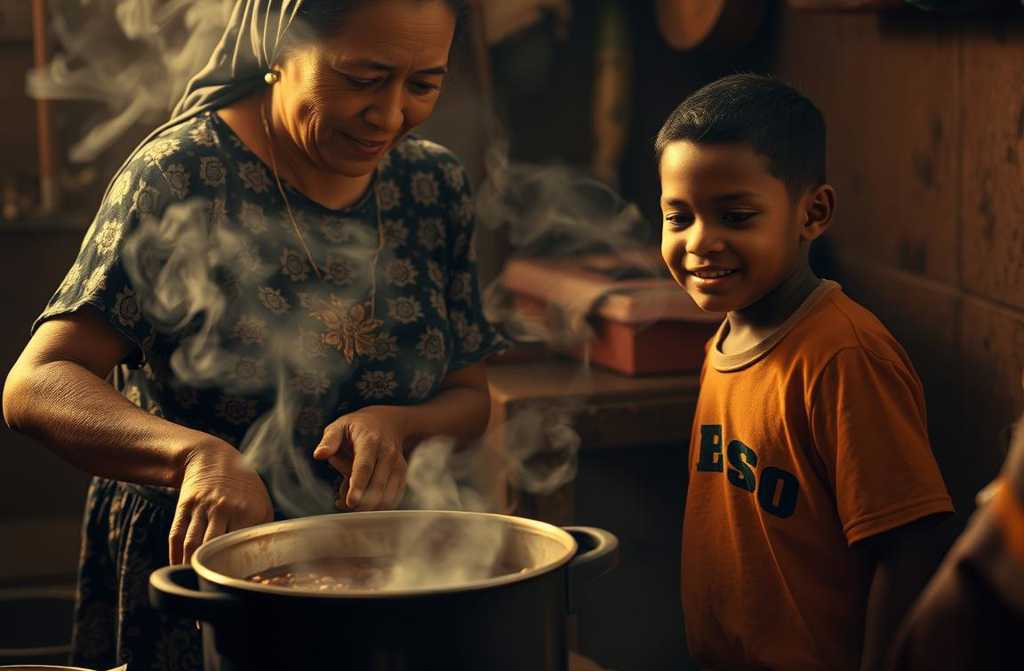З життя
In Rio de Janeiro, in one of those neighborhoods where electric wires tangle above the streets like the city’s veins, lived Mariana.

**Monday, 15th May**
In a corner of London, where the tangled overhead wires hummed like the citys veins, there lived a woman named Eleanor Whitmore. She balanced three children, two jobs, and an ancient stove that bore the weight of her enormous silver stockpotthe heart of her home. Every Sunday, no matter how exhausting the week had been, she cooked a proper roast: beef, Yorkshire puddings, carrots roasted in honey, and gravy so rich it could mend a broken spirit. It wasnt just dinner. It was a ritual of survival, an act of love, a reminderto herself and her childrenthat even in the darkest times, there was still warmth inside them.
*Mum,* asked Oliver, her eldest, one morning, *why do you cook so much when were barely making ends meet?*
Eleanor wiped her hands on her apron and looked at him.
*Because when you cook, you remember theres still warmth in your heart. And that fire inside? No one can put it out.*
But their street wasnt just laughter and light. It held injustice too. One afternoon, on his way home from school, Oliver was stopped by officers. He was detained. His face, his hoodie, the shade of his skinthat was evidence enough. No witnesses. No proof. Just suspicion, heavier than truth.
Eleanor nearly collapsed. She sold her old mobile, emptied her savings, and hired a solicitor. The trial was brisk, sterile: white walls, stern faces, rehearsed phrases.
*No concrete evidence,* the judge said, *but circumstances lean against him.*
Then the solicitor asked for *another kind of proof.* She nodded at Eleanor.
Into the courtroom Eleanor walked, carrying her steaming stockpot, filling the air with the scent of slow-cooked beef and rosemary.
*Your Honour,* she said, steady but firm, *this is Sunday roast. Been cooking since dawn. My son couldnt have done what they sayhe was peeling potatoes, stirring the gravy, tasting for salt.*
The room fell silent. A few nervous chuckles rose, but the aroma took overdeep, honest, unmistakable.
The judge leaned in, lifted the lid, inhaled, then took a spoonful. Then another. He closed his eyes.
*And what sort of evidence is this?* he murmured when he finally looked up.
*The only kind Ive got,* Eleanor answered. *The taste of life built on whats real. Not words or accusations. Just doing. Just love.*
The judge took another spoonful. Then he said, *Sometimes truth is served hot.*
Oliver was acquitted. No paperwork, no official proofjust the unshakable truth of a mothers love, turning a simple meal into irrefutable testimony.
After that, Eleanor didnt stop. She opened a small café in their neighbourhood. Called it *Justice with Gravy.* She cooked for neighbours, for friends, for anyone who needed honest food and warmth. On the wall, in her own hand-painted letters, it read:
*”Not everythings proved on paper. Some innocence smells like fresh roast.”*
The café became more than a place to eat. It became a symbolof truth, resilience, the quiet power of one woman with a stockpot and a heart too big to break. Her children grew up watching love outlast injustice, watching flavour and scent stand taller than legal documents.
Eleanor taught Oliver and his siblings something vital: real justice starts where care does. With courage. With action. And she taught them the strongest proof isnt wordsits doing.
Now, when new customers walk into her café, she always says:
*Sit down. Have a plate. We dont just serve roast here. We serve truth.*
And so, in the heart of London, beneath tangled wires and terraced houses, Eleanor keeps doing what she does bestfeeding hearts, saving some from injustice, and reminding them that sometimes, the strongest evidence smells like a Sunday roast.

















